No challenge is too big for Tony Hollingsworth, Ph.D.
The Ironman Triathlete, who has completed 2.4-mile swims, 112-mile bike rides, and 26.2-mile runs, has spent the past 20 years focused on one of medicine’s most lethal diseases — pancreatic cancer.
“I chose pancreatic cancer because it was a big problem and no one else wanted to do it,” he said.

|
| Tony Hollingsworth, Ph.D. |
The internationally renowned professor and director of pancreatic cancer research at the Eppley Institute studies the biology of pancreatic tumor progression to find new diagnostics and therapies for a disease in which the lifetime risk of developing is one out of 79 people.
On Tuesday, he was recognized as the 2011 Scientist Laureate, the highest honor given to a UNMC researcher.
A team effort
Dr. Hollingsworth is principal investigator of a $5.3 million, five-year Specialized Program of Research Excellence (SPORE) grant in pancreatic cancer and leads a Biomarker Discovery Laboratory that is part of the Early Detection Research Network of the National Cancer Institute.
The Scientist Laureate Award, he said, is about his team.
“I’ve always said 15 to 20 minds are better than one, so my principal responsibility is to create an environment where people can be creative, think and undertake experiments to test their ideas.”
Invaluable help
Those minds — along with a legion of clinicians, pathologists and research colleagues — explore the biology of pancreatic tumor progression. The medical center’s organ harvest/rapid autopsy program — one of few in the country — enables patients who die with pancreatic cancer to donate their organs for research purposes.
Their generosity provides immeasurable help to UNMC’s pancreatic team.
“We don’t normally get access to these tissues so this gives us an opportunity to capture the entire history of the disease progression,” he said.
A deeper understanding
Since the program started five years ago, the pancreatic team has studied the disease progression of more than 50 people and received funds to study critical questions that could help future patients. Once diagnosed, a person has less than a 5 percent chance of living more than five years.
“We want to provide a better quality of life and extend survival,” he said. “More than that, if we understand the biology of how tumors spread and affect the functions of different organ systems, we should be able to design therapies to stop the process or better treat the systemic problems caused by tumors.”
CONGRATULATIONS!, Dr. Hollingsworth.
Mike Berney